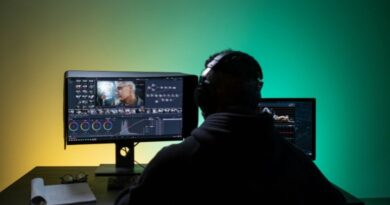AI in Space Exploration: Pushing the Boundaries of Discovery
AI in Space Exploration: Pushing the Boundaries of Discovery
Introduction
Space exploration has always captivated humanity’s imagination, and now, with the integration of Artificial Intelligence (AI), we are witnessing a new era of discovery and innovation. AI’s ability to process vast amounts of data, make intelligent decisions, and adapt to new challenges has revolutionized space exploration, enabling scientists and engineers to delve deeper into the cosmos and push the boundaries of our understanding of the universe. In this article, we will explore the remarkable impact of AI in space exploration and how it is shaping the future of interstellar discovery.
The Advent of AI in Space Exploration
1. AI-Enhanced Satellite Systems
AI has significantly improved the functionality of satellite systems, making them more efficient and capable of gathering and transmitting data in real time. AI-powered satellites can monitor Earth’s atmosphere, weather patterns, and geological changes, providing invaluable insights for disaster management, agriculture, and climate studies.
2. Autonomous Rovers and Probes
The utilization of AI-driven rovers and probes on planetary surfaces has revolutionized our understanding of distant celestial bodies. These autonomous machines can analyze terrain, identify potential hazards, and conduct scientific experiments without human intervention, thereby increasing the efficiency and scope of exploration.
3. Deep Space Exploration
AI has enabled spacecraft to autonomously navigate through the vastness of space, making real-time adjustments to their trajectories based on the data they collect. This has allowed for more extended and precise missions to study distant planets, asteroids, and comets.
AI and Data Analysis
4. Efficient Data Processing
One of AI’s most significant contributions to space exploration is its ability to process vast amounts of data at incredible speeds. This capability is crucial for interpreting complex astronomical observations and generating actionable insights from space missions.
5. Pattern Recognition and Anomaly Detection
AI algorithms excel at identifying patterns and anomalies in astronomical data, enabling scientists to discover new celestial phenomena and unexpected occurrences in the cosmos that would otherwise remain hidden.
Advancing Space Research with AI
6. Exoplanet Exploration
AI-powered telescopes and instruments have been instrumental in the discovery of exoplanets beyond our solar system. These technologies can analyze the light spectra of stars and detect minute fluctuations, hinting at the presence of distant planets.
7. Searching for Extraterrestrial Life
AI algorithms assist in the search for potential signs of extraterrestrial life by analyzing radio signals and cosmic radiation for patterns that could indicate intelligent communication.
AI and Spacesuit Technology
8. Enhancing Astronaut Safety
AI plays a pivotal role in spacesuit technology, providing real-time monitoring of an astronaut’s vital signs and environment. It can promptly alert mission control of any potential health risks, ensuring astronaut safety during spacewalks and extravehicular activities.
9. Personalized Spacesuits
With AI, spacesuits can be tailored to individual astronauts’ specific needs and body shapes, providing maximum comfort and mobility during extended space missions.
The Future of AI in Space Exploration
10. AI-Driven Space Colonization
As humanity sets its sights on establishing colonies on other planets, AI will be crucial in managing essential resources, developing sustainable habitats, and ensuring the well-being of future space settlers.
11. Interstellar Travel
AI’s adaptive problem-solving capabilities could play a pivotal role in overcoming the challenges of interstellar travel, such as navigating through cosmic radiation, managing long-duration missions, and maintaining spacecraft integrity.
12. Space Mining and Resource Utilization
AI-driven autonomous mining systems may be the key to unlocking the vast resources present on asteroids and other celestial bodies, providing valuable raw materials for future space missions.
Conclusion
The integration of Artificial Intelligence in space exploration has propelled our understanding of the cosmos to unprecedented heights. From autonomous rovers exploring distant planets to AI-driven telescopes discovering new worlds, AI has become an indispensable tool in humanity’s quest for knowledge and exploration beyond Earth’s boundaries.
With ongoing advancements in AI technology, the future of space exploration looks promising. As we continue to harness the power of AI, our journey into the unknown will be characterized by remarkable discoveries, unprecedented innovation, and the realization of humanity’s most ambitious dreams.
FAQs About AI in Space Exploration
1. How does AI help in space exploration? AI aids space exploration by processing data, enhancing satellite systems, enabling autonomous rovers, and analyzing astronomical observations.
2. What is the significance of AI in exoplanet exploration? AI-powered telescopes can detect exoplanets by analyzing light spectra, providing valuable insights into planets beyond our solar system.
3. Can AI be used in spacesuit technology? Yes, AI is used to monitor astronauts’ vital signs and design personalized spacesuits for enhanced comfort and safety.
4. How might AI contribute to space colonization? AI can help manage resources, develop sustainable habitats, and ensure the well-being of space settlers in future colonies.
5. Will AI enable interstellar travel? AI’s problem-solving capabilities could aid in overcoming challenges associated with interstellar travel, making it a possibility in the future.





Pingback: Digital Inclusion: Closing the Technology Gap | UTHSI 2023